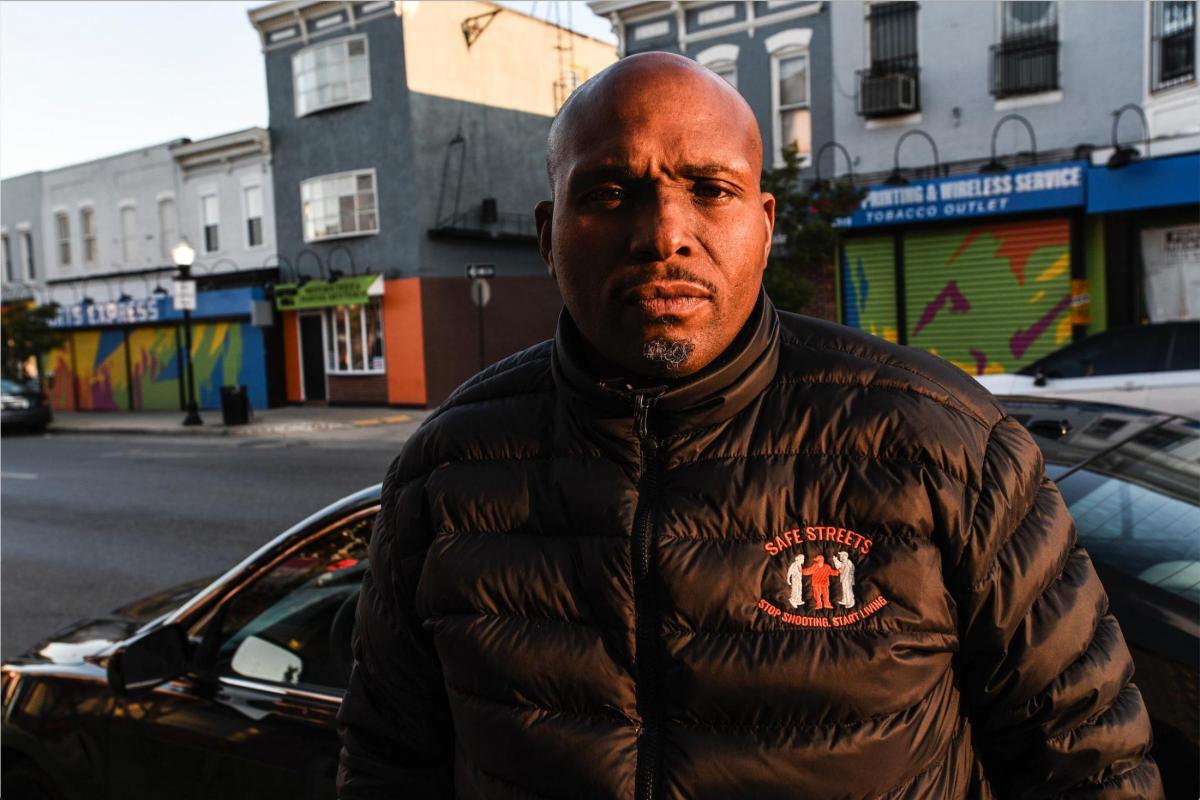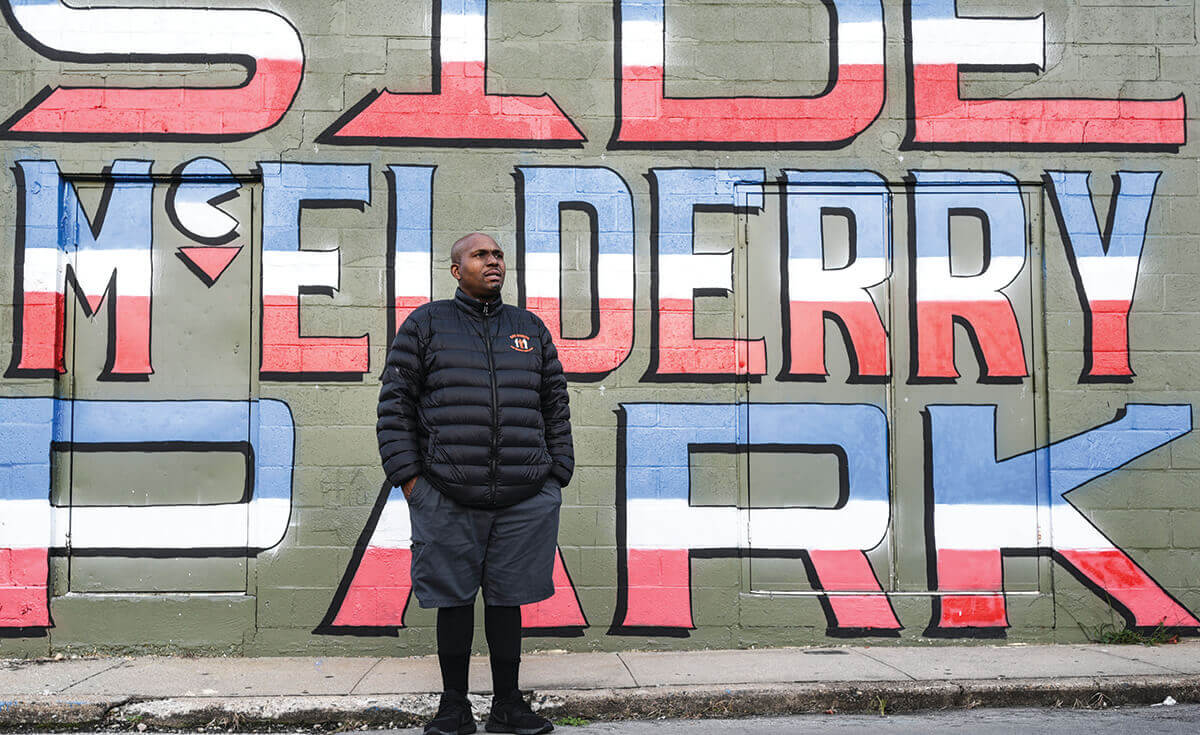
Dante Barksdale, the respected and well-known Baltimore Safe Streets leader, an ex-offender who turned his life around to save others from gun violence, was shot and killed Sunday morning. Even in a city beset by violence, the shocking daylight homicide of the 46-year-old Barksdale, an outgoing personality and familiar face to many in Baltimore, stunned the city, which grieved his death yesterday as the news of the slaying quickly spread throughout the afternoon.
Barksdale joined the then-new gun violence prevention program in 2008 as an outreach worker. He was an integral part of the Safe Streets team that kept McElderry Park homicide-free for two years, something the neighborhood hadn’t experienced for decades, earning a Community Hero Award from the Johns Hopkins Bloomberg School of Public Health.
Mayor Brandon Scott, who had named him to his transition team, described Barksdale as the “heart and soul” of the gun-violence prevention program. He called his death a “major loss to Safe Streets, the communities they serve, and the entire City of Baltimore.”
“My heart is broken with the loss of my friend Dante Barksdale, a beloved leader in our community who committed his life to saving lives in Baltimore,” Scott said, vowing to maintain his commitment to the Safe Streets program while highlighting the “sobering reminder of how dangerous this frontline work is.” “While I am devastated by the loss of my Brother in the fight to save lives in Baltimore, I will not let those who chose to violently take his life dampen the light of his work.”
Barksdale was shot in the head in a courtyard of the Douglass Homes housing project, a highly visible open space near a busy bus stop and heavily trafficked East Fayette Street, shortly after 11 a.m., according to police who remained on the scene into last night. Known to his friends by his nickname “Tater,” Barksdale grew up in East Baltimore and spent a lot of time working in the Douglass Homes community. Police have not released any information regarding a motive for the shooting.
Erricka Bridgeford, the Baltimore Community Mediation Center director and co-founder of Baltimore Ceasefire 365, met Barksdale more than a decade ago when she began training Safe Streets outreach workers in de-escalation and mitigation techniques. They became close friends, often relying on each other when they faced struggles, personally or professionally, in their common effort.
“Dante was sarcastic and funny, but you couldn’t mistake his seriousness and commitment to the work of reducing gun violence,” said Bridgeford, who visited the spot where Barksdale had fallen and burned sage during a healing ritual in his honor Sunday. “He laughed easily, but he didn’t play when it came to the work he did. He was a role model. When I was going through something, he was the first person I called. Spiritually, now that he has passed, I will rely on him even more. His light will live on.”
Terry Williams—an ex-offender who runs the nonprofit mentoring program Challenge 2 Change on East Monument Street, only blocks away from where Barksdale began his outreach career with Safe Streets—had just returned from a neighborhood clean-up when he received the news of his friend’s death. “I knew of him when we were both incarcerated, the way you hear about certain people, but we didn’t meet until we’d come full circle,” Williams said. “He was a fun-loving guy, but in order to reach the kids in the street he was trying to help and resolve those potentially deadly disputes, you have to cast aside that tender side of yourself and he could to that. He knew how to talk to young people.
“I’m still trying to wrap my head around it [his death],” an emotional Williams said. “A part of me is so angry. Another part of me is so sad.”
Modeled after the CeaseFire program in Chicago, which was credited with reducing shootings and homicides in that city, Safe Streets hires ex-offenders like Barksdale who are committed to rebuilding their lives and their communities. Trained as outreach workers and conflict-resolution mediators, they develop relationships with men and women considered at high risk of gun violence—or using a gun.
Barksdale, Bridgeford said, had the ability to interrupt shootings and de-escalate situations in the moment. But he was often left frustrated, like herself, by the lack of resources to help young people change their circumstances and the broader debilitating environment in which they grow up in the city. “So much of the city lives in broken systems—the school system, the housing system, the legal system, the policing system, the health system. “For the people of Baltimore,” Bridgeford said, “losing ‘Tater’ should be a wake-up call.”
Best-selling author D. Watkins, an East Baltimore native like Barksdale, called his friend’s death “a sad day” for the city.
“I don’t think Baltimore really understands and takes into consideration that these guys [Safe Streets workers] are putting their lives on the line,” Watkins said. “City officials should really do more for these guys and we, the people of Baltimore, should use this an opportunity to salute their work.”
Watkins also noted Barksdale’s under-appreciated role as a local historian and storyteller. Barksdale had grown up in the high-rise Lafayette Courts public housing development, which was demolished after more than four decades in 1995. Barksdale chronicled his coming-of-age story in his memoir in Growing up Barksdale: A True Baltimore Story in 2019 with writer Grace Kearney.
Kearney, who is finishing an MFA in writing, said she met Barksdale in 2016 by happenstance while she was working as a research assistant at Harbor Hospital. “He was so warm, he just drew people in,” she said. “And he trusted me, really with no reason to trust me, to tell his story.”
Barksdale’s name, of course, is widely associated with Baltimore City drug-dealing and violence, courtesy of the HBO series The Wire. He was the nephew of Nathan “Bodie” Barksdale, whose criminal career was fictionalized in the groundbreaking television series. “He did not want to die in prison like his uncle did,” Williams said. “Helping others became his way out, to heal himself and his community, and reconcile his actions as a younger man.”
Barksdale’s outreach work was front and center in an early 2009 Baltimore magazine profile of Safe Streets and more recently, he served as a key resource for a December Baltimore magazine story on gun trafficking.

Safe Streets, now in 10 communities in the city, boasted dramatic success in its first years in McElderry Park, a neighborhood which, at the time the program began, had the highest rate of gun violence in the city. That site’s first director, Leon Faruq, hired Barksdale, whom he knew from when they were both in prison. Faruq recognized that his name carried weight in the streets and, like himself, Barksdale wanted a different legacy, a positive one.
“Dante came with Leon to speak to my class in 2008 and connected with the students,” said Daniel Webster, director of the Johns Hopkins Center for Gun Policy and Research and an early and longtime Safe Streets advocate. “He called me after and asked to meet. He loved his work, but wanted bigger impact. I encouraged him to further his education and build on his strengths. He got his BA while working as an outreach worker. That opened the door for a position at the health department—and professional advancement, job security, and opportunities to lead. He later got his MA from Sojourner Douglas College.”
Webster, who had numerous discussions over the years with Barksdale about violence in Baltimore and how to prevent it, said he valued his humanity and perspective and called him “a professor of the streets.”
“Dante had a huge heart while also understanding how the most violent social networks operated,” Webster said. “He could use his warmth and humor if that is what the situation called for, and knew how to negotiate deals to keep someone from getting killed. Dante knew the hunger, trauma, fear, anger, and shame that drove people to do risky things like rob, sell drugs, or shoot. He was deeply loved and respected by many.”
Across social media and on his personal Facebook page Sunday, hundreds of people in the city expressed their grief and affection for Barksdale, who also leaves behind children, including a teenage daughter.
In December, he posted the defining message of his life’s work to his personal Facebook page: “The most gangster shit in the world is forgiveness.”
